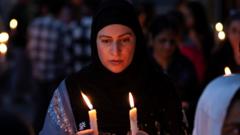Amidst escalating violence and national tensions, the Kashmiri identity has become a target rather than a badge of pride for many in India. Following a deadly attack in Pahalgam that left 26 people dead, members of the Kashmiri community find themselves facing increasing harassment and intimidation. Shabir Ahmad Dar, a shawl seller with over 20 years of experience, was violently assaulted in Mussoorie by members of a Hindu right-wing group, who blamed him for the attack due to his ethnic heritage.
"People attacked us, rifled through our stalls, and told us to leave town," Dar recounted, reflecting on the trauma of the incident. He fled Mussoorie along with other Kashmiri vendors, fearing for their safety. Following public outrage over the assault, police arrested the perpetrators but released them shortly after imposing a nominal fine, further aggravating the feelings of insecurity among the Kashmiri community.
Recent months have seen an alarming uptick in reports of Kashmiri students and vendors across various Indian cities facing harassment. Instances of students being chased from campuses or physically assaulted merely for their background have become increasingly common, sparking widespread fear. One nursing student lamented the hostility she faced in her neighborhood, where she was branded a terrorist.
In the backdrop of the Pahalgam attack, which has been described as one of the deadliest civilian assaults in recent history, concerns for safety are palpable. Security forces have since tightened their grip on the region, detaining thousands and demolishing homes associated with suspected militants — acts that have been condemned as "collective punishment" against innocent civilians.
The harsh crackdown has intensified feelings of alienation among Kashmiris. An anonymous student voiced frustration over being treated as a suspect, despite the fact that they were also grieving over the recent attack. This sentiment is echoed by Shafi Subhan, a fellow shawl seller, who remarked that the violence has upended a sense of community that once thrived in Mussoorie.
While Kashmir has seen some progress towards stability in the past few years, notably since the revocation of its special status in 2019, recent escalations in violence and rising anti-Kashmiri sentiments threaten this fragile peace. Many Kashmiris are left grappling with complex feelings of grief and fear as they navigate a prejudiced landscape.
As public vigil marches and protests emerge in response to the violence, commentators emphasize the need to separate the actions of a few militants from the innocent lives of Kashmiris, who have long suffered under strained circumstances. Voices of Kashmiri activists and writers have urged for compassion and understanding, highlighting that the consequences of violence should not be borne by an entire community.
Yet, despair lingers, exemplified by the plight of individuals like Mohammad Shafi Dar, who has lost everything in the aftermath of state violence and is uncertain about the fate of his son linked to the ongoing conflict. "We were punished for his alleged crimes, but why?" he lamented, embodying the profound impact of viewed identities in a country grappling with complex power dynamics.




















